Interns Gather for Poster Day
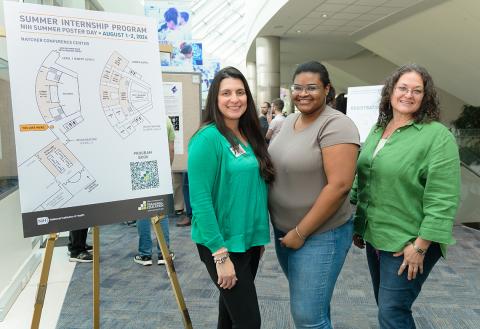
Photo: Marleen Van Den Neste
More than 800 lab interns from across NIH convened in August to display their research at Summer Poster Day, organized by the Office of Intramural Training & Education (OITE). The annual event took place in Bldg. 45’s Natcher Conference Center.
Dr. Natasha Lugo-Escobar, director of the postbac and summer research programs at OITE, helped organize the two-day event.
“I’m here as a support system for the trainees,” she said. “For many of them, it might be their first summer internship program and that can be overwhelming and intimidating.”
Lugo-Escobar has worked alongside a team for several months in advance of the event, developing website content, managing registration, coordinating with NIH institutes and centers, and initiating conversations with this year’s interns.
The Poster Day event provides students from different education levels—high school, undergraduate, graduate and professional schools—the ability to showcase their research, and an opportunity to practice public speaking. Three summer interns shared their experiences.
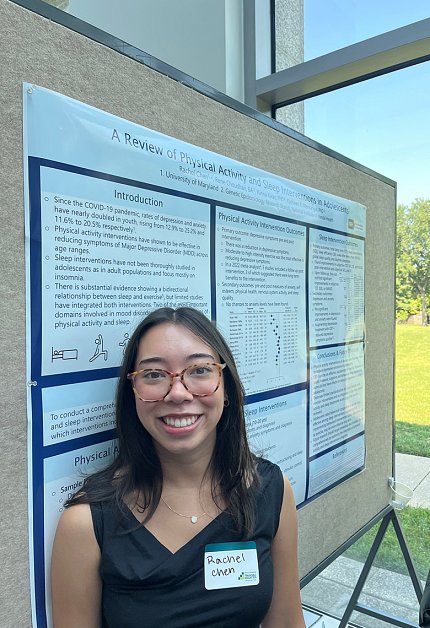
Photo: Kristine Duru
College junior neuroscience and dance double major Rachel Chen combined her passion for both subjects and conducted research incorporating physical activity to curb depression symptoms. She interned in the National Institute of Mental Health (NIMH) genetic epidemiology branch under Dr. Kathleen Merikangas.
Chen’s project investigated whether physical activity and sleep interventions for adolescents to reduce depression symptoms included both physical activity and sleep. She and her team found that, though previous literature connects sleep and physical activity, nothing connects the two when targeting an intervention for depression.

Photo: Kristine Duru
Intern Ava Lorenzetti also spent her summer at NIMH, in Bldg. 35. She kept busy, “always doing something, whether running behavior [tests] or analyzing results.” In her assigned lab, Lorenzetti and her colleagues ran an experiment in which they inhibited neurogenesis in lab rats. They aimed to find out how neurogenesis affected their approach/avoidance behavior and decision-making in an open-field test.
The test box was cold in one corner. Eventually, food was put into the cold corner to try to lure the rats away from the warmer part of the chamber. Ultimately, they observed a difference between the rats with and without neurogenesis. The temperatures affected all the rats’ behavior. However, the food reward was less successful at drawing the rats that lacked neurogenesis to the cold corner. Those rats moved more, spent less time in the conflict zone and took longer to start eating than the neurogenesis-intact rats.
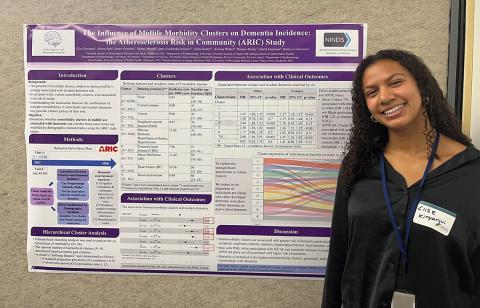
Photo: Kristine Duru
Elise Kinyanjui, a college senior, worked in the Stroke, Cognition And Neuroepidemiology (SCAN) lab at the National Institute of Neurological Disorders and Stroke (NINDS). Kinyanjui worked with the postdoctoral researcher Dr. Marco Egle and senior investigator Dr. Rebecca Gottesman to research how smoking and multiple chronic conditions, such as cancer and atrial fibrillation (AFib), in mid-life are associated with developing incident dementia later in life. The project used cluster analysis to test this connection.
The researchers ultimately found that people who smoked or had metabolic conditions, peripheral arterial disease, AFib or heart failure are all at higher risk of developing dementia. Kinyanjui also said they found mortality to be a big factor in the association of dementia and chronic conditions. The intern explained that clusters with no significant association to dementia, like renal dysfunction, may lack association because some in the sample died before the average age when dementia develops.
For the OITE office, Summer Poster Day centers on ensuring that all students, whether it be their first internship, or as they transition into the workforce or next educational stage feel confident and prepared in presenting their research.
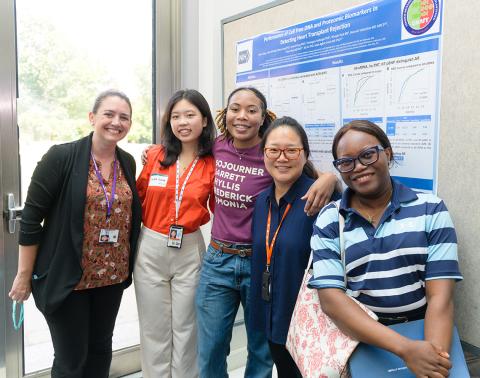
Photo: Marleen Van Den Neste
“Summer Poster Day celebrates the intern’s hard work and dedication throughout the summer. It provides them with a platform to share their research and accomplishments with their peers and the broader NIH community,” said Lugo-Escobar.
Each intern talked about what they are taking away from their time at NIH.
Chen described the warmth of the NIH community and expressed appreciation for NIH opportunities such as grad fairs, lectures and connecting with other interns. Additionally, her collaboration with NIH’ers and hearing other ideas taught her there is no set path to research. “It’s been interesting having experience working with people at all different levels,” Chen said.
Kinyanjui said, “A summer internship at the NIH is different than an internship at a university. I think coming to NIH has made research feel less like an undergraduate, academic practice and more valuable, like you have a job to do.”
She learned new skills in discerning what data is most significant to the public. And she also learned more about the world of cluster analyses, how to apply them in real life and most importantly, the value of paying attention to your health to prevent diseases like dementia later in life.
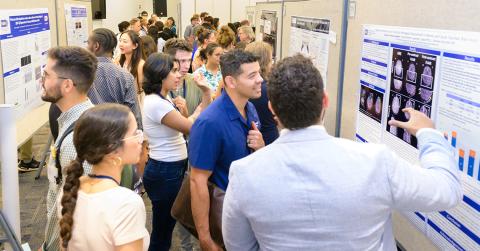
Photo: Marleen Van Den Neste
Lorenzetti called her summer at NIH a comprehensive, enlightening experience. “Being here and seeing the specific subjects that people are working on, seeing other people’s posters—it’s opened my eyes to the work that NIH is doing, and it’s really cool,” she said.
“[Interns] need advice and support for their career and professional development,” said Lugo-Escobar. “They also need guidance to navigate research group dynamics and to prepare for these types of events.”
What’s next for these interns? Chen and Kinyanjui have resumed their studies at the University of Maryland and St. Mary’s College of Maryland, respectively. Chen is also working in a lab, conducting more psychology and neuroscience research. As for Lorenzetti, her college career is just beginning. She is a freshman at the University of Michigan and plans to major in neuroscience.
Beyond college, Kinyanjui and Chen hope to work with their NIH colleagues to turn the work they’ve done this summer into research papers. Kinyanjui hopes to return to NIH after her senior year as a postbac to continue building on her research. And after pursuing her master’s and doctoral degrees, she envisions herself employed at NIH long-term.
“I think NIH is a great facility,” Kinyanjui said. “They have great teaching programs and a lot of opportunities here. I’ve appreciated the time I’ve had here, and I hope I have the opportunity to come back.”
